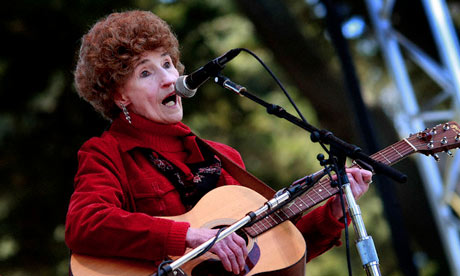Bluegrass pioneer who sang of miners and the downtrodden

Hazel Dickens performing in 2009.
Of all the voices raised since the death of Woody Guthrie that have told the stories of American working men and women, few have been more passionately eloquent than that of Hazel Dickens, who has died aged about 85, though she allowed it to be thought that she was 10 years younger. Herself a child of hard times in the West Virginia coalfields, she devoted much of her life to singing about, and for, coalminers and their families, whose hardships she encapsulated in compositions such as Black Lung and They'll Never Keep Us Down. The latter was written in 1976 for Barbara Kopple's Harlan County, USA, a chilling documentary about the Brookside Mine strike in Kentucky in the early 70s. Hazel's strident, heart-piercing delivery perfectly crystallises the spirit of the film, and when she sang at previews for the strikers themselves, as the folklorist Ralph Rinzler recalled, "she found a deep, responsive chord. They trusted her, they were strengthened by her, she was one of them". Born in Mercer County, at the southern tip of West Virginia, the eighth of 11 children, Hazel learned her music from her father, a Baptist minister, and from country music radio shows such as the Grand Ole Opry and the WWVA Jamboree from Wheeling, West Virginia. By the 50s she and some of her brothers had moved to Baltimore in search of work, and from her wages at a factory making tin cans she bought a bass so as to join them in a bluegrass band playing for other Appalachian emigres. Around that time she met other devotees of old-time mountain music including Mike Seeger and Alice Gerrard, with whom she began to work in the mid-60s. Their first recordings, for Folkways, offered the unprecedented sound of a female duet singing bluegrass, but it was their Rounder albums Hazel & Alice (1973) and Hazel Dickens & Alice Gerrard (1976), containing songs by Hazel such as My Better Years, Ramblin' Woman and Working Girl Blues, that caught the imagination of young female folksingers everywhere, among them Emmylou Harris. Twenty years later, when the albums were reissued on CD, the country singer Naomi Judd named them as her and her daughter Wynonna's first musical influence: "Their raw, hard-edged voices were so distinctive and true." Hazel herself described her singing simply as "that old mountain stuff where you just rear back and let it go – beltin', as some people call it". Now living in Washington, she contributed songs to the LP collections Come All You Coal Miners (1973) and They'll Never Keep Us Down: Women's Coal Mining Songs (1984), and appeared in John Sayles's powerful film dramatisation of a West Virginia coal strike, Matewan (1987). "Whether she is singing on a picket line, in a concert hall, or at a national convention of the United Mine Workers," wrote Rinzler, "Hazel puts herself and her music to work for the benefit of people faced with struggle – for wages, for rights, for their very survival." But she was much more than an activist of the coalfields, and in the first of her three solo albums, Hard Hitting Songs for Hard Hit People (1981, the title borrowed from Guthrie), she epitomised the spirit of old-time mountain music and the men and women to whom it mattered. Through the 70s, 80s and 90s, Hazel was regarded by many of her contemporaries as the finest female singer in hardcore bluegrass, and she performed with bands such as the Johnson Mountain Boys and the Nashville Bluegrass Band, and wrote songs such as Mama's Hand and You'll Get No More of Me. In 1994 she was the first woman to receive a merit award from the International Bluegrass Music Association, and in 2001 she received a National Heritage Fellowship from the National Endowment for the Arts. In the same year her story was told in the documentary Hazel Dickens: It's Hard to Tell the Singer from the Song. Her autobiography, Working Girl Blues, written in collaboration with the country music historian Bill Malone, was published in 2008. Hazel's music inspired the San Francisco financier Warren Hellman to create an annual festival, Hardly Strictly Bluegrass, in Golden Gate Park; she was on the first bill in 2001 and every year thereafter. Her last public performance was in March at the South By Southwest festival in Austin, Texas, where, her friend and frequent musical partner Dudley Connell says, "she pinned them to the wall". Her marriage to Joseph Cohen ended in divorce in 1970. She is survived by her brother Robert and numerous nieces and nephews. • Hazel Jane Dickens, singer and songwriter, born 1 June 1924 or 1925; died 22 April 2011
No comments:
Post a Comment